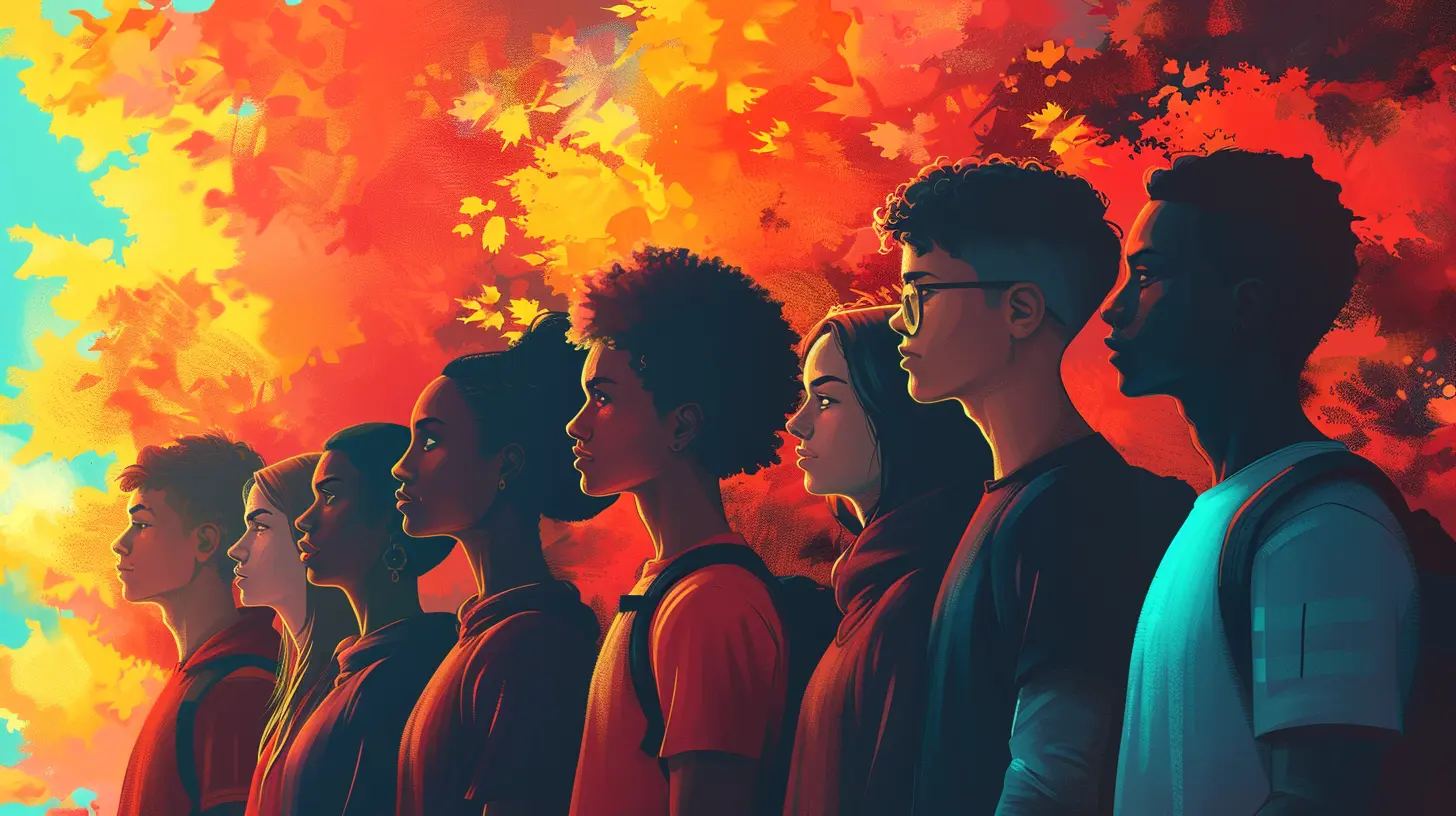The Role of Campus Diversity in Choosing the Right College
15 June 2025
Let’s face it—choosing the right college is kind of a big deal. It’s like picking your home for the next four years (or more, if you enjoy cafeteria food that much). You’ll be sleeping there, eating there, pulling all-nighters with coffee-stained hoodies, and—most importantly—learning stuff that shapes your future.
But amidst all the college pamphlets filled with smiling students and sunny lawns, there’s a question that deserves way more attention than it usually gets:
> "What role does campus diversity play in my college decision?"
Spoiler alert: a pretty huge one.
In this article, we’re diving deep (but not too deep—we don’t want you drowning in jargon) into why campus diversity should be a top priority when you're scouting your future academic playground.
What Even Is Campus Diversity?
Let’s get this out of the way. When we say “campus diversity,” we’re not just throwing around buzzwords to sound woke and intellectual.Campus diversity involves a beautiful mix of differences—not just race and ethnicity, but also gender identity, sexual orientation, socioeconomic background, religion, age, abilities, nationality, and even thought. Yep, intellectual diversity is a thing too!
It’s the vibrant mosaic of students and faculty who bring their own stories, cultures, beliefs, and opinions to the table (or library, or coffee shop discussion hub—whatever you prefer).
Why Does Campus Diversity Matter?
There are lots of factors to consider when choosing a college: location, tuition, programs, Greek life (if that’s your thing), sports, and, of course, dining hall food quality. But diversity often gets shoved to the side like last week’s leftover pizza.Here’s why that’s a mistake.
1. You Learn More Than What’s in the Textbook
Let’s be real, half of college learning happens outside the lecture hall—truth bombs dropped during late-night dorm convos, heated debates over pineapple-on-pizza at the dining hall, and impromptu cultural dance nights.When you’re surrounded by people who don’t think, look, or live like you, your mind stretches in all the best ways. You start to see the world through different lenses (and not the Instagram kind).
Diverse campuses naturally lead to conversations that challenge stereotypes and encourage critical thinking. And isn’t that kind of the whole point of going to college?
2. Real-World Prep
Unless you plan on living under a rock post-graduation (and even rocks are becoming multicultural these days), you will be dealing with people from different backgrounds in your career.A diverse campus is like a practice round for the real world. You learn empathy, communication, flexibility—all major soft skills that employers drool over.
Plus, when you’ve worked on group projects with folks from all walks of life, navigating future office politics feels like a breeze. Okay, maybe not a breeze, but at least a manageable gust of wind.
3. Inclusive Environments = Better Mental Health
Here’s the tea: Being in a space where you feel seen, heard, and accepted works wonders for your mental health.Colleges that prioritize diversity often also have better support systems for students from underrepresented backgrounds. Think: cultural centers, affinity groups, and counseling services that actually understand your unique experiences.
And it’s not just about being included—it’s about belonging. There’s a big difference.
4. It Sparks Innovation
Have you ever noticed how some of the best ideas come from the most random, diverse groups of people? That’s not a coincidence—it's science.Studies show that diverse teams are better at problem-solving and creativity. So imagine what that means in a college setting. More perspectives = more “Aha!” moments.
Whether you're designing a product in an entrepreneurship class or creating a short film about modern identity, diverse voices push you to think bigger, bolder, and outside your comfort zone.
Questions to Ask When Considering Campus Diversity
So you’re convinced (or at least curious). But how do you actually measure diversity at a college? Glad you asked!When researching schools, here are some sneaky-smart questions to dig into:
1. What Does the Demographic Breakdown Look Like?
Check out statistics on race, ethnicity, international students, first-generation college attendees, and LGBTQ+ representation. Most colleges publish this data, and if they don’t—well, that speaks volumes too.2. Are There Student-Led Cultural and Identity-Based Organizations?
Active student orgs are a sign of a thriving, diverse campus life. From Black Student Unions to Latinx fraternities to Interfaith dialogue groups—these clubs aren’t just about representation, they’re hubs of community and support.3. What Kind of Diversity Trainings/Workshops Are Offered?
It’s one thing to have a multicultural student body. It’s another for a school to actually help students and faculty understand and celebrate those differences.Look for programs that go beyond the surface, offering real dialogue—not just once-a-year diversity days with vague slogans.
4. How Diverse is the Faculty?
Representation matters, not just among students but also in the folks teaching them. Diverse faculty bring diverse curricula, perspectives, and mentorship opportunities.Because let’s be honest—having a professor who “gets you” can be a game-changer.
Diversity Is More Than a Checkbox
Let’s debunk a myth while we’re here: Diversity isn’t about meeting a quota or creating a United Nations simulation on campus. It’s about enriching the college experience for everyone.Think of it like a smoothie (stay with me). A good blend has variety—banana, berries, maybe some spinach if you’re into that—each ingredient adds something unique, but together they make something delicious.
Colleges that embrace diversity aren’t just better—they’re richer, fuller, more flavorful. They’re the smoothies of higher education.
Don’t Forget About Inclusion
Diversity’s BFF is inclusion. You can have a diverse student body, but if those students feel isolated, under-supported, or tokenized, then what’s the point?Choosing a school that talks the talk and walks the walk on inclusion is non-negotiable.
Look for these signs:
- Accessible housing and classrooms
- Support for non-traditional students (e.g., parents, part-timers)
- Gender-neutral bathrooms
- Time off for cultural and religious holidays
- Transparent policies against discrimination and bias
It’s all in the details, friends.
Real Talk: How Diversity Changed My College Experience
Let me get a little personal here. I went to a college where my roommate was from Nairobi, my lab partner was a first-gen student from Mississippi, and the guy who made killer vegan tacos every Saturday was a former Marine turned graphic design major.We didn’t agree on everything. In fact, we had some heated debates fueled by too much caffeine and not enough sleep. But my worldview expanded in ways no textbook could ever teach.
The friendships, the collisions of perspective, the late-night “what is life?” convos—that’s what I remember. That’s what shaped me.
A Quick Reality Check
Okay, before you rush out to apply to the most diverse college on the planet, let’s keep it real: No school is perfect. Some may have great stats on paper but struggle with real inclusion. Others might not be too diverse yet but are making genuine strides.The key is to do your homework. Read student reviews. Visit the campus if you can. Talk to alumni. Slide into a school’s DMs (just kidding—kind of).
At the end of the day, you’re choosing your people. Your support system. Your community. Don’t settle.
Final Thoughts: What Do YOU Want Your College Experience to Be Like?
Choosing a college isn’t just about academics and a decent WiFi connection (although both are pretty important). It’s about where you’ll grow—not just in your major, but as a human.Campus diversity adds layers to that growth. It challenges, empowers, and ultimately prepares you for a world that’s gloriously complex.
So when you’re scrolling through college websites, attend that info session, or take a campus tour, ask yourself:
> "Will I feel seen here? Will I be pushed to grow here? Will I find my people here?"
If the answer is yes, you’re probably on the right track.
TL;DR (Too Long; Didn’t Read)
- Campus diversity isn't just a trendy phrase—it adds serious value to your college experience.- It fosters deeper learning, better connections, and serious real-world prep.
- Don’t just look at diversity stats; look at how inclusive and supportive the environment actually is.
- Ask smart questions when researching schools.
- Diversity and inclusion go hand in hand—don’t settle for one without the other.
- Your college experience is shaped by your community—make sure it's one that helps you thrive.
all images in this post were generated using AI tools
Category:
College PreparationAuthor:

Olivia Lewis
Discussion
rate this article
3 comments
Lys Cain
This article beautifully highlights the importance of campus diversity in shaping a vibrant college experience. Embracing different perspectives enriches learning and personal growth. Choosing a college that values diversity can profoundly impact your educational journey and future success.
June 21, 2025 at 3:24 AM

Olivia Lewis
Thank you for your insightful comment! I completely agree—embracing diversity truly enhances the college experience, fostering growth and enriching our communities.
Honor McBride
Exploring campus diversity can profoundly shape college experiences—what insights have you uncovered in your journey?
June 18, 2025 at 10:49 AM

Olivia Lewis
In my journey, I've discovered that engaging with diverse perspectives fosters personal growth, enhances critical thinking, and cultivates a sense of belonging, enriching the overall college experience.
Regina Fletcher
Campus diversity enhances learning experiences and fosters inclusivity, making it crucial in college selection.
June 18, 2025 at 4:52 AM

Olivia Lewis
I completely agree! Campus diversity truly enriches education and promotes a welcoming environment for all students.



